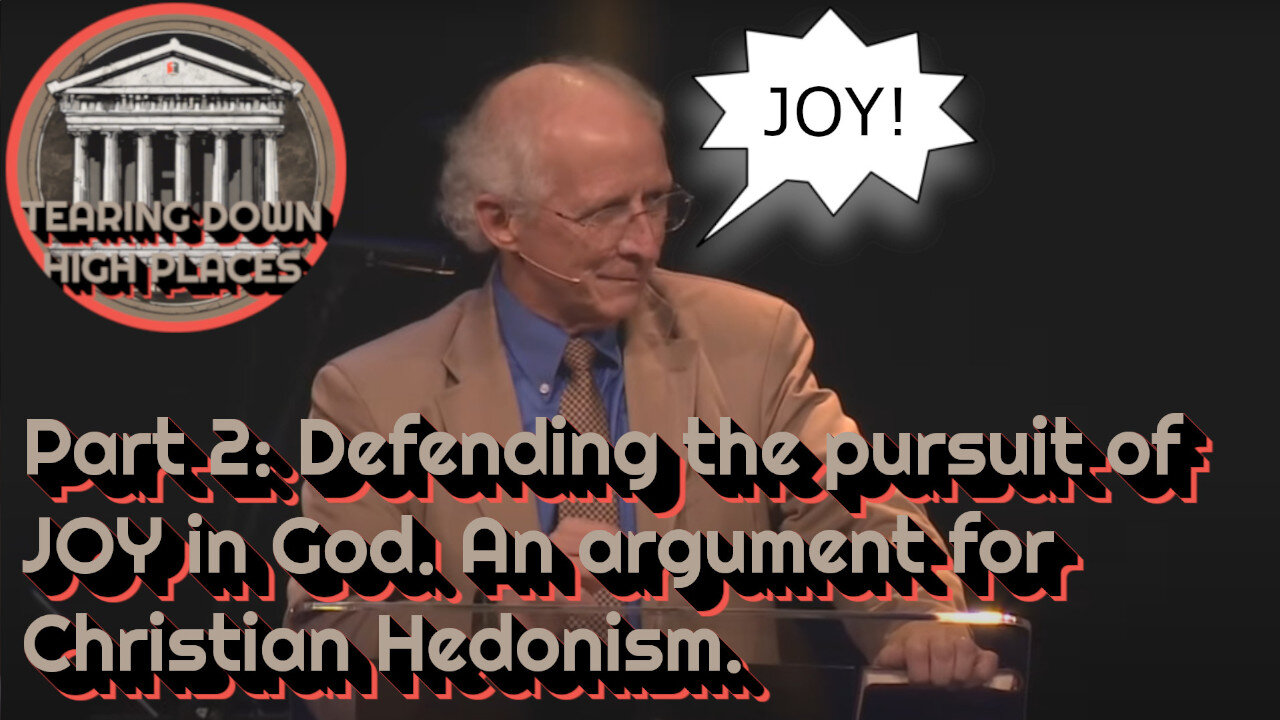Premium Only Content

EP 82 | Pursuing Joy in God Part 2: Defending John Piper's Christian Hedonism
In this riveting follow-up to last week's epic discussion, Pastor Luke Fraser joins Average Joe and Pastor Tim to passionately defend Christian Hedonism against recent critiques. Drawing from his doctoral work, Luke unpacks John Piper's teachings through deep dives into Ecclesiastes, church history giants like Jonathan Edwards, Augustine BB Warfield, and personal stories of transformation. Discover why joy isn't just a bonus in the Christian life—it's the fuel—and how pursuing satisfaction in God alone reshapes everything from daily struggles to eternal hope. Whether you're a Piper fan, a skeptic, or just seeking more joy in your faith, this episode will challenge, inspire, and equip you to tear down idols of fleeting happiness. Don't miss the biblical fireworks and gracious dialogue that could redefine your pursuit of God!
Podcast Subsections
1. Introduction and Guest Introduction (00:00:33 - 00:01:39)
Description: Average Joe and Pastor Tim kick off the episode with enthusiasm, introducing their guest, Dr. Luke Frazier from Island Bible Church. They briefly reference the previous episode's length and impact, setting the stage for a discussion about Christian Hedonism. Luke humorously clarifies he's not the Dr. Luke from the Bible, establishing a lighthearted tone.
2. Reflections on the Previous Episode (00:01:39 - 00:03:36)
Description: The hosts and Luke discuss the previous episode, which was notably long and featured a guest, Ardell, critiquing John Piper’s Christian Hedonism. Tim admits struggling to follow due to the episode’s length, while Joe appreciated its depth. Luke previews his intent to counter Ardell’s arguments with a scriptural defense.
Key Points:
• Tim found the previous guest’s points hard to follow but appreciated his character.
• Joe was inspired by the biblical depth of the discussion.
• Luke notes Ardell’s forthrightness but highlights the lack of exegetical grounding in his critique.
3. Luke’s Defense of Christian Hedonism (00:03:36 - 00:07:18)
Description: Luke outlines his plan to defend Christian Hedonism, both the concept and its name, using his doctoral work. He emphasizes testing the doctrine scripturally and separating Piper’s articulation from the broader biblical principles. The hosts express excitement for a gracious, scripture-based wrestling with the topic.
Key Points:
• Luke aims to address critiques that Christian Hedonism overemphasizes joy, potentially making it an idol.
• He plans to use scripture, particularly Ecclesiastes, to defend the pursuit of joy in God.
• The hosts value the ability to debate within Christianity without labeling others as heretics.
4. Luke’s Personal Journey and Transformation (00:07:18 - 00:19:47)
Description: Luke shares his personal story, detailing his upbringing in a Christian family, his struggles with idolatry through martial arts, and a period of depression and searching for meaning in his 20s. He describes how reading John Piper’s Desiring God and diving into scripture transformed his perspective, leading to his calling as a pastor.
Key Points:
• Luke’s grandfathers were pastors with contrasting approaches (legalistic vs. joyful).
• His crisis of faith led him to test various philosophies and religions, finding only scripture to be true.
• Piper’s teachings provided a framework for finding satisfaction in God, steering Luke toward ministry.
5. Engaging with Other Worldviews (00:19:47 - 00:22:43)
Description: Luke responds to a question about engaging with other religions, drawing from his experience reading texts like the Hindu Vedas and the Quran. He advocates using Ray Comfort’s approach to redirect conversations to the gospel, emphasizing Christianity’s unique claim that only God can make us right with Him.
Key Points:
• Luke advises against deep dives into other religious texts unless for academic purposes.
• He emphasizes the urgency of pointing people to the Bible as the foundation for truth.
• The conversation transitions back to Luke’s journey and his immersion in Piper’s theology.
6. Testing Christian Hedonism: Exegesis, History, and Experience (00:22:43 - 00:30:40)
Description:
Luke explains his doctoral dissertation, which tested Christian Hedonism in three “laboratories”: exegetical (using Ecclesiastes), ecclesiological (church history), and experiential (his ministry on Long Beach Island). He argues that Christian Hedonism predates Piper, tracing it to figures like Augustine and Edwards.
Key Points:
• Luke chose Ecclesiastes to exegetically prove that true joy comes from God, not worldly pursuits.
• He traces Christian Hedonism through church history, citing theologians who emphasized joy in God.
• On Long Beach Island, a place of worldly pleasures, Luke tests whether these satisfy compared to God.
7. Exegetical Defense: Ecclesiastes and Joy (00:30:40 - 00:37:07)
Description:
Luke dives into his exegetical work, focusing on Ecclesiastes, where Solomon’s nine experiments to find happiness (e.g., knowledge, sex, wealth) all fail apart from God. He connects this to Hebrews 12:1-2, arguing that joy was Jesus’ motivation for the cross, making it central to Christian life.
• Key Points:
Solomon’s experiments in Ecclesiastes show that worldly pursuits are “vanity” without God.
• Hebrews 12:1-2 reveals joy as Jesus’ driving force, validating Christian Hedonism’s focus on joy.
• Luke cites theologians like Jonathan Edwards, who saw joy as the fuel of Christian living.
8. Addressing Misconceptions of Christian Hedonism (00:37:07 - 00:43:47)
Description:
Luke tackles misconceptions from the previous episode, particularly the caricature that Christian Hedonism devalues earthly pleasures. He uses C.S. Lewis to argue that God encourages pursuing pleasure in Him, not rejecting worldly joys, which are fleeting. He also addresses the joy vs. happiness debate, asserting they’re interchangeable biblically.
Key Points:
• Christian Hedonism doesn’t condemn earthly pleasures but redirects them to God as the source.
• Luke refutes the idea that happiness and joy are distinct, citing Spurgeon and Randy Alcorn.
• He shares an anecdote about enjoying an omelet to illustrate fleeting vs. lasting joy.
9. Refuting the Keswick Theology Critique (00:43:47 - 00:52:06)
Description: Luke strongly disputes Ardell’s association of Christian Hedonism with Keswick theology, noting that John Piper platforms critics of Keswick, like Andy Naselli. He defends Piper’s lifestyle, addressing Ardell’s anecdote about Piper’s car, and explains his own need to clarify living in an expensive area without embracing prosperity theology.
Key Points:
• Piper’s seminary employs Andy Naselli, a leading critic of Keswick theology, undermining Ardell’s claim.
• Luke contextualizes Piper’s caution about appearances due to the rise of prosperity gospel in the 1980s.
• He shares his own experience living in a costly condo on Long Beach Island, emphasizing a “wartime lifestyle.”
10. Happiness, Joy, and the Pursuit of God (00:52:06 - 01:00:04)
Description: The conversation explores whether pursuing joy leads to God or seeking God leads to joy. Luke, citing Pascal, argues that everyone pursues happiness, but Christians must seek it in God. He ties this to Ecclesiastes, where Solomon’s failed experiments point to God as the true source of satisfaction.
Key Points:
• Pascal’s idea that all people seek happiness underscores Christian Hedonism’s universal relevance.
• Solomon’s Ecclesiastes shows the futility of seeking joy apart from God.
• Luke emphasizes that full satisfaction in Christ awaits heaven, not earth.
11. Scriptures and True Joy (01:00:04 - 01:01:59)
Description: Luke addresses a question about finding joy through scripture, stressing that knowing Jesus requires the Bible. He compares longing for Christ to missing his wife while away, emphasizing that Christian Hedonism teaches partial satisfaction now, with full joy in eternity.
Key Points:
• Joy in Jesus cannot be separated from scripture; attempts to bypass it are futile.
• Christian Hedonism acknowledges incomplete satisfaction on earth, fueling longing for Christ’s return.
12. Closing and Future Discussion (01:01:59 - 01:05:05)
Description: The episode wraps up with Luke proudly identifying as a Christian Hedonist, while Joe hesitates due to concerns about pietism, suggesting a future discussion. Luke closes with Psalm 16:11, emphasizing eternal pleasures at God’s right hand. The hosts propose a potential follow-up episode with Ardell to continue the debate.
Key Points:
• Luke embraces Christian Hedonism; Joe is intrigued but cautious about pietism.
• Psalm 16:11 encapsulates the pursuit of joy in God.
• The hosts plan a potential part two or three to explore pietism and invite Ardell for a rebuttal.
Hashtags #ChristianHedonism, #JohnPiper, #BibleJoy, #EcclesiastesExposed, #FaithAndPleasure, #ChurchHistory, #TearingDownHighPlaces, #PursueGod, #ReformedTheology, #PodcastFaithTalk
___________________
Join TDHP Facebook Page - https://www.facebook.com/share/g/1Yy5NVp3NQ/
Get Email Notifications of new episodes - https://tearingdownhighplaces.com/join-us/
Follow us on X! - https://x.com/TearingDownHP
Listen on Apple - https://podcasts.apple.com/us/podcast/tearing-down-high-places/id1777616971
Watch on Rumble - https://rumble.com/c/c-6289037
Also on Spotify - https://open.spotify.com/show/2ZBp4x9r2tdyjmXIe3mnbP
Tell us what channels and topics are most important to you – email us at [email protected]
Don’t forget to like and share!!
-
 29:25
29:25
Tearing Down High Places
1 month agoEP 86 | Charlie Kirk’s Martyrdom: A Call to Bold Faith and Revival
1792 -
 14:45
14:45
Mrgunsngear
19 hours ago $12.40 earnedFletcher Rifle Works Texas Flood 30 Caliber 3D Printed Titanium Suppressor Test & Review
15.1K9 -
 17:17
17:17
Lady Decade
21 hours ago $0.17 earnedMortal Kombat Legacy Kollection is Causing Outrage
6672 -
 35:51
35:51
Athlete & Artist Show
22 hours agoIs Ryan Smith The Best Owner In The NHL?
2.05K -
 22:56
22:56
American Thought Leaders
1 day agoCharles Murray: I Thought Religion Was Irrelevant to Me. I Was Wrong.
3.19K2 -
 36:22
36:22
Brad Owen Poker
3 hours agoGIGANTIC $17,000+ Pot In BOBBY’S ROOM! TRAPPING Top Pro w/FULL HOUSE!! Big Win! Poker Vlog Ep 326
1.44K -
 3:53
3:53
NAG Daily
20 hours agoRUMBLE RUNDOWN: DREAM HACK SPECIAL W/Greenman Reports
9555 -
 1:28
1:28
Damon Imani
1 day agoThey Laughed at Trump’s Cognitive Test — Damon Made Them REGRET It!
1.79K6 -
 9:14
9:14
Freedom Frontline
22 hours agoAdam Schiff PANICS As Eric Schmitt Exposes His Dirty Lies LIVE
9503 -
 10:32
10:32
GBGunsRumble
23 hours agoGBGuns Armory Ep 153 Adler Arms AD-9`
1.4K1